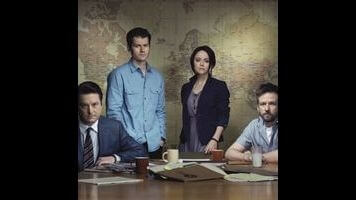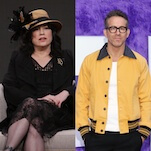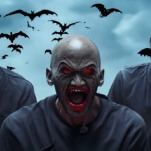I strongly suspect I'm going to like Rubicon once it gets going. I also strongly suspect that tonight's two-hour premiere is going to turn a lot of people off the show. I mean, this may be the slowest-moving show in the history of time. It's well-acted and stylishly filmed, but nothing much happens. I've had to watch the second episode (I covered the first hour here) a couple of times to make sure I got the gist of everything that was happening. At first, I was going to complain that nothing happened, but that wasn't quite right, particularly in an hour where the main character was nearly run over by a taxi. The more accurate complaint, I think, is that things happen, but we cannot yet see where they're leading. Rubicon is still failing at the task of coming up with believable episode-sized chunks to split its serialized story up into.
The show gets better at this. Episode four, which airs in two weeks, is a very good episode of television, potentially even great (pending a rewatch), and it mostly leaves the conspiracy arc behind in order to tell a story about the think tank outside of the confines of its daily work. And I'd say that I still think the show is compelling, even as I'm not sure if I have faith in it. I like the direction of the series and how it seems to turn everything in New York into an intersection of perpendicular lines. I also like the central performance by James Badge Dale – I like it a lot – who spends a lot of time squinting at stuff but doing so compellingly. There's a scene in this episode where he solves a code left for him by his dead mentor, and though the solution was pretty dumb (HIDE IN PLAIN SIGHT), just watching Dale solve it was fun. He's very good at portraying the inner thought processes of his character, Will, and that's invaluable on a show like this.
At this point, the writing is only adequate. I wouldn't say it's bad. There are clumsy lines here and there, but for the most part, the structure is solid. The problem is that it's the structure from the second ten minutes of a '70s conspiracy thriller, not the second episode of a TV show. There's a sense that this is one story streeeeeeeeeeeeeeeeeeeeeetched out until it loses all sense of dramatic momentum, and that sense nearly ruined the pilot for me. Episode two does little to make me think this notion is inaccurate. If anything, it's even more stretched out, even as the other elements that do work are working even better. It's a curious mix where I spend most of the episode criticizing the series' minutiae, but by the end of it, I really want to move on to episode three.
Again, I think the series gets better at this over the next two weeks, so if you're at all intrigued, I'd suggest sticking with it through at least episode four. But I can see where a lot of people are going to bail. It does, after all, seem like the perfect series to catch up with on DVD, where a slow-moving plot is less of a problem because there aren't those weeks in between episodes to kill storyline momentum. On the other hand, both of AMC's other series, Mad Men and Breaking Bad, don't exactly have rocket-speed plots, but they create a sense of mounting tension that makes it imperative that you tune in week to week. Not a lot happened in last week's Mad Men season premiere, but I'm still certain to tune in for the rest of the season.
Granted, that show features relationships with characters built over the course of three seasons and an episode. But even if we look back at the second episode of Mad Men (or Breaking Bad, which had a rockier start, but a more sure-footed one than Rubicon), we can see an important thing that sets those shows apart from this one, and one that should be entirely laid at the foot of the writers of Rubicon: Both Breaking Bad and Mad Men had instantly iconic character introductions. You knew who Don Draper was by the end of the pilot and knew you wanted to puzzle out more of his secrets. You knew who Walter White was by the end of the pilot. Obviously, you didn't know everything, but you knew enough to know that if you kept watching, you'd learn more and more interesting things. And we have! And in both cases, the supporting cast was introduced just as well. Our first meet-up with Jesse Pinkman or Peggy Olsen or Joan Holloway or Skyler White gave us a real sense of who those people were beyond the actors playing them.
You don't get that sense in Rubicon. The central character is the only one I can even remember the name for, the others are all still so bland. Will is compelling because we've spent the most time with him and we need someone to sympathize with, so it falls to him. But he's also compelling because Dale is essentially shouldering the load of a LOT of exposition and MAKING him compelling. Honestly, though, I couldn't tell you what the deal with any of the other characters is, based on this episode and the pilot. I can't even tell you their names. There's Mustache Guy, Quirky Brunette, Single Mom, Gruff Boss, and Straight-laced Guy (also, Miranda Richardson). I'm sure we'll get to know them more as the weeks go on, but Rubicon hasn't exactly put its best foot forward in terms of character introduction. There's an attempt to do this via what I guess is the episode's main plotline, which involves Will having to be the boss to a bunch of former colleagues, but this gets so lost in the midst of all of the conspiracy shenanigans that I didn't even realize it was supposed to be the episodic plot for quite a while.
And yet, there's something to the texture of the show that is immediately compelling to me, that goes beyond the fact that I tend to like this kind of show. There's a real world-weariness to it, a sense of a civilization teetering on the brink of dystopia. And there's always a sense of just how much staring at papers and looking for little details has warped the minds of the people who work at the think tank, how it's made the possibility that the conspirators won't have to push Will toward suicide and can, instead, just wait for him to jump that much more plausible. The series also looks like it feels – dense and dank and impossibly crowded with terrifying potentialities. There's dumb stuff – Will manages to avoid getting run over by a taxi because he stops to pick up a lucky rabbit's foot?! – but I like the feel Rubicon gives me, even as I don't like the nuts and bolts.
Stray observations:
- Oooooh … Single Mom is an informant. Honestly, that's a revelation that might have been better held for midseason, unless the show already knew we'd be expecting an informant and wanted to use our knowledge of her secret against us as the season went on. That would be a better move if she were anything beyond "Single Mom."
- I kind of like Quirky Brunette in spite of myself. It's obvious that there's something going on with her, and I hope to find out just what it is.
- I still find the soundtrack for the series overbearing, almost to a fault, as if they don't trust us to find Dale solving a code (or nearly getting run over by a taxi) compelling events on their own.
- I suspect we'll be waiting quite a while to figure out how Miranda Richardson ties into everything here.
- There's been a lot of talk about the creative upheaval on the show – creator Jason Horwitch was pushed out after … well, it's not clear after what, but a creative dispute with AMC is most likely, and veteran TV hand Henry Brommell was brought in from episode two on – but I don't think it will necessarily sink the show. Brommell's a guy who's been bombing around TV for a while, and AMC made the change early enough that he can rebrand the show as his own, if he really wants to, or just spice up the outline Horwitch had for the series. It's not a GOOD sign, but it's also not the sign of sure disaster many want to see it as.








































